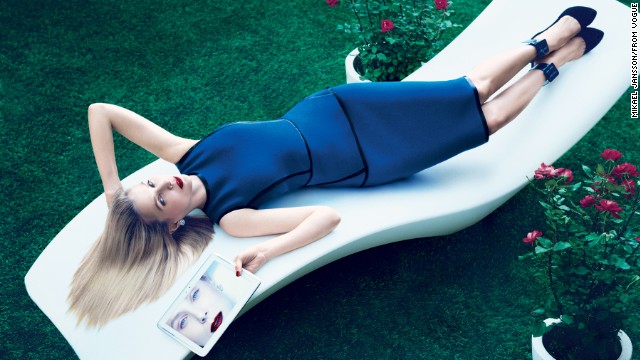 Aug. 22, 2013 Yahoo CEO Marissa Mayer has posed a vast public health problem in the latest edition of Vogue…
Aug. 22, 2013 Yahoo CEO Marissa Mayer has posed a vast public health problem in the latest edition of Vogue…
…Literally and figuratively.
That can be a good thing if it helps ignite a media conversation on the saturation of sexualization in our culture that epitomizes the objectives of our movement at “Brave Girls Want” to take back media from depictions of women that have narrowed to a sliver. (wanna help? Here’s how!)
The Yahoo CEO’s media maneuver is exactly what our allies and partners at Brave Girls Want.com are striving to CHANGE for a broader, healthier worldview for girls. It’s mind-bendingly frustrating to see how far we still have to go when tech titans turn to sex kitten pin-up poses hoping media will couch it as a ‘bold’ move.
Let’s be clear…there’s nothing brave or bold about this depiction in Vogue, or her dodging ambition. (fab fairytale analysis, Time!)
I don’t give a flying fig about Marissa’s sensationalized persona as a shy, coder fashionista (complete with tabloid innuendo from her husband that she’s not as shy as she seems) nor do I care about Yahoo’s marketing wink and nod to create buzzworthy press and media ratings lift (while cynically jousting to pit women against each other in judgmental outrage baiting for PR purposes)…
What I DO care about is how our hyper-sexualized cultural context is landing on kids, altering healthy sexuality in favor of twisted depictions of what is deemed ‘sexy’ in media messaging…From the ridiculous ‘brokeback pose’ of comic book sheroes and chair-straddling Victoria’s Secret mannequins in mall displays to upside down CEO tech titans splayed on a chaise with a patently absurd powerless sexploitation vibe.
It’s ambient, pervasive, and harmful, as the weighty APA report from the American Psychological Association Task Force on Early Sexualization duly notes…Not to mention inescapable, with media and marketing recklessly over-riding public health in the name of profit.
Just as my infamous media joust with the “snowangel vs spread eagle” Target ad in Times Square was NOT about “one ad”…this Marissa Mayer debate is not about “one pose.”
It’s about media context amidst an ambient sea of messages that singularly silo and narrowcast even the most accomplished women leaders into imagery reflecting “hotties” and boy toys.
Can you envision Michele Obama in the Vogue spread? Hillary Clinton? Sheryl Sandberg, perhaps?
If so, what’s the message? ”Lean-in, but make sure you’re viewed as a hottie while you’re doing it?” These are predominant themes in our skewed, media saturated times.
When women leaders are positioned in come hither, coy, fluff-n-stuff magazine spreads like this (the only thing missing is a lollipop and a finger tugging at the lip to infantilize her any further) it sends a clear, over-arching statement about what we as a society ‘value’ about women.
I’m not saying PR poses should be stylistically stereotyped in “wear power red and cross your arms with a masculine stance” idiocy either, I’m saying the messages we’re sending in ALL forms of media are sticking to youth like gum on the bottom of a shoe…No matter how much we may try to scrape it off later, there’s always still visible residue.
My own teen took one look at Marissa Mayer’s spread and dismissively shoulder-shrugged:
“So basically, no matter how smart or athletic or successful you are, it’s still all about hotness.” Boom. And ouch.
This nudged me toward more impromptu teen inquiries, including her pal Nick, an 18 year old boy, who said,
“It’s not as bad as MOST ads…at least she’s wearing clothes.”
Well, isn’t that just ducky. We’ve devolved to a cultural context of a new pornified low, akin to “at least she wasn’t twerking.”
The saturation of media in ‘surround sound’ is contextually key. When girls are encouraged to become prepubescent eye-candy before they hit the double-digits, and ‘buffed boys’ strive for ripped six-packs and pecs, taut-n-hot Taylor Lautner abs, and ‘pumped up’ athletic physiques, there IS going to be socioemotional fallout. “Duh.” As an irreverent tween might say.
That fallout might take the form of desensitization, where kids view sexualization as urban wallpaper and a universal given, as it seeps into their psyches.
Just listen to their words…
In addition to countless “Wait, WHO is Marissa Mayer?” deer in the headlights quizzical looks from teens (handy to differentiate context between ‘everyday sexualization’ and ‘public figure/celebrity’ sexualization which became a nuanced conversation in itself)…I also received tons of comments like:
“I don’t see the big deal, it’s not like she’s wearing anything skimpy”
Or: “Women are always posed that way, it’s like the Facebook skinny arm stance to put your hand on your hip so you don’t look fat. That’s just how it’s done.” (whoa, what? really?)
A couple of teens danced on the edge of discomfort pondering Mayer’s pose, but couldn’t seem to tap into what was unsettling, like the 18-year old girl who took a micro-focus judging Mayer’s clothing and appearance while missing the stance itself. She said,
“Actually, her dress looks like something she might wear to work…” adding, “I like the highlights and the flatiron…but what’s with the shoes? They look very…I dunno, 50 Shades of Grey-ish.”
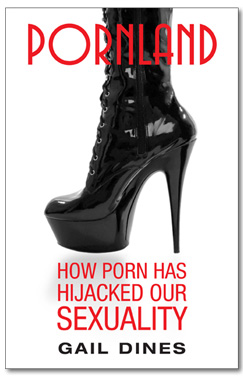 Again, humorous, with some definite truth to the bondage feel, but this goes to urban cultural context again…yep, those teens are talking about 50 Shades of Grey as no big deal, and some have no doubt read the whole series. Hmn. Again, about that ‘healthy sexuality’ issue…(cough)
Again, humorous, with some definite truth to the bondage feel, but this goes to urban cultural context again…yep, those teens are talking about 50 Shades of Grey as no big deal, and some have no doubt read the whole series. Hmn. Again, about that ‘healthy sexuality’ issue…(cough)
Without context or frame of reference how does porn or erotica translate into emerging sexuality and healthy child development?
Gail Dines has a ton of great research in this arena, including her book Pornland: How Porn Has Hijacked Our Sexuality, and Media Education Foundation has great film/study guide edu resources too, like The Price of Pleasure: Pornography, Sexuality & Relationships)
And no, I’m not equating Marissa Mayer’s Vogue spread on a par with any of the above, so trolls, you can safely withhold your usual pearl clutching prude/hand-wringing accusations as I DO ‘get it’ that most of the teens were ‘non-plussed’…
Many adults also view the CEO sprawl as a ‘non-story’…But to me that’s a mistake, as it reveals the much larger hole unraveling in the fabric of our media lives that needs attention: the full immersion and lens of desensitized normalcy that comes from swimming in a sea of sexualization.
Kids can’t ‘see it’ because it’s all relative by comparison, they’ve been raised in it like the air they breathe and know no other environment. My Brave Girls Want colleague Rebecca Hains aptly phrases this dynamic: “If you want to know what water is like, don’t ask the fish!”
I got a kick out of teens’ reactions when those who didn’t ‘see’ the pose, had their ‘aha’ moment when I showed them this satirical send-up of “men-ups” (males in similar poses as women, photographed by Rion Sabean which activist Soraya Chemaly shared on Twitter).
As with most media literacy, the subtext of what isn’t being said is as important as what IS noticed.
How does self-objectification alter girls’ worldviews, achievements, and ability to “lean-in” to aspirations?
What does the Vogue/CEO message convey to girls and women as future female leaders? Or to men working alongside them?
How does rampant media sexualization and objectification play out in larger cultural connotations today?
In pop culture messages? (like the Rihanna/Chris Brown Grammys or Rick Ross rap/rape lyrics)
On college and high school campuses? (where some still appear ‘unclear on the concept’ of what rape is)
At the elementary school playground? (where harassment is commonplace and body snarking is relentless, endured at increasingly younger ages)
How exactly IS hyper-sexualization, body image objectification, and women being consumed by the male gaze showing up behaviorally in younger kids?
In the upcoming book, Masterminds and Wingmen, all about “boy culture,” author Rosalind Wiseman devotes a chapter to “Girl World” with the subhead “Who’s disrespecting whom?”
Wiseman poignantly captures the kind of hyper-sexualized banter I heard over three years in my ‘living lab’ of K-5 playground duty working on “Body Blitz: Media, Shaping Youth”…
Her prose gives a snapshot of how these 6th grade boys and girls interact with each other and it’s all VERY familiar, “A girl can’t say anything to a boy without him being perverted…”
…”When we’re at recess and we want a ball, I say to Martin, “Can you give me the ball?” Martin says, “You want my balls? Hey, guys, Carla wants my balls!”
“If I asked for a stick, he’d say I want to touch his stick. And all the other boys just laugh. They’re always doing things like this.”
She goes on to explain the messed up dynamics when preteen girls feel it’s exhausting, annoying and rude, yet the boys feel pressured to be ‘hilarious’ egged on by others, or cajoled into ‘going along with it’…time and again.
I saw this constantly on the school yard at much younger ages…third and fourth grade, specifically. Worst part is when I’d hear middle-school kids rant about an issue they obviously felt VERY strongly about, then conclude with defeated exasperation, “I guess it’s no big deal, really,” as they stuffed those feelings of angst, frustration, confusion, and betrayal in gender conflicts and misunderstandings.
Really? No big deal? What will this bring into an entire generation? Dysfunctional relationships? Media’s pervasiveness of sexualization is upending child development of healthy sexuality. That’s not something to be ‘stuffed’ and ignored.
When crass pop culture credos blur the lines into ‘twerky’ quirky hubba-hubba hottie behavioral suggestiveness damaging kids’ socio-emotional health and well-being it can play out in some dicey ways.
Take Steubenville for example…
Again, this is a public health problem when kids are witnessing a rape and don’t even view it as a rape.
This Rape 101 infographic by UltraViolet educates well with a definitive “This must stop” call to action. (here’s the full visual, which should be in every locker room, college campus, and youth event to toggle the memory if need be)
Evidently college campuses are shifting verbiage to ‘non-consensual sex’ rather than the uglier reality of ‘rape’…wow. Do we need to go back to square one and explain basic humanity 101?
Is there really ANY nuance between violence and violation?
What about when depravity goes viral?
Must we keep underscoring the very obvious connection of what happens when we turn humans into objects and then callously humiliate and denigrate for sport?
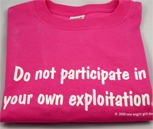 This is why “Do not participate in your own exploitation” should be the selfie-motto for teens and tweens treading perilously through murky identity waters. (And clearly for CEOs tapping into their inner seductress in a publication with a 1,315,304 circulation in the phone book sized fall fashion fest issue!)
This is why “Do not participate in your own exploitation” should be the selfie-motto for teens and tweens treading perilously through murky identity waters. (And clearly for CEOs tapping into their inner seductress in a publication with a 1,315,304 circulation in the phone book sized fall fashion fest issue!)
Whether self-induced or media prompted, sexualization and objectification is laced with subtexts of power, coercion and control…none of these are key elements for healthy intimacy.
Sex shouldn’t be used as a power tool, but that’s what kids are getting as a behavioral media message.
What is the causation vs corollary interplay as we delve deeper into the role of media hyper-sexualization and the outcomes of the massive CDC study on adverse childhood experiences (ACEs) (child abuse, rape, prostitution, assault, gender based violence).
Where does “textual harassment” fit into the exertion of physical and mental control using social media and sex as a power tool?
What about the insidious creep of teen dating abuse seeping into kid culture? Are kids taking cues from media?
How does hyper-sexualization factor into head games and emotional blackmail along with physical possessiveness stemming from ‘ownership’ of an ‘object?’ —These are some of the burning core questions I’d like to have answered, pop culture researchers…
 We’ve already established the toy industry is complicit in marketing ever earlier renditions of sexualization and objectification.
We’ve already established the toy industry is complicit in marketing ever earlier renditions of sexualization and objectification.
From canted poses to vapid values, and relational aggression normative in ‘reality TV’ humiliation and degradation, it’s no wonder youth resort to ‘comparative analysis’ in “this is not as bad as that” frame of reference for kids’ media, marketing and sociological imagery. (um…like CEOs in pin-up poses)
Make no mistake. Rampant sexualization IS a public health issue.
We should be concerned with the soul-seeping trickle down impact on kids, from quantifiable harm of age compression taking the form of body image dissatisfaction, eating disorders, teen dating violence, depression, substance abuse and beyond.
“Brave Girls Want” solutions… and we’ve got a few ramped and ready to raise awareness among those who don’t even see the problem yet. (ahem, paging Ms. Marissa Mayer…)
Who knows…Marissa Mayer might ignite the ENOUGH! switch among women leaders on a global scale who would like to see her get off her back and STEP UP and join us instead, to turn a negative into a positive. If she wants good press, that’s a way to ‘make it happen’ fast!
Reminder: Women who break barriers also PLACE them by normalizing objectification. (see my post on Danica Patrick as a ‘racy role model’) When leaders ‘give and take away’ in a zero sum game, a certain Madeleine Albright quote comes to mind…
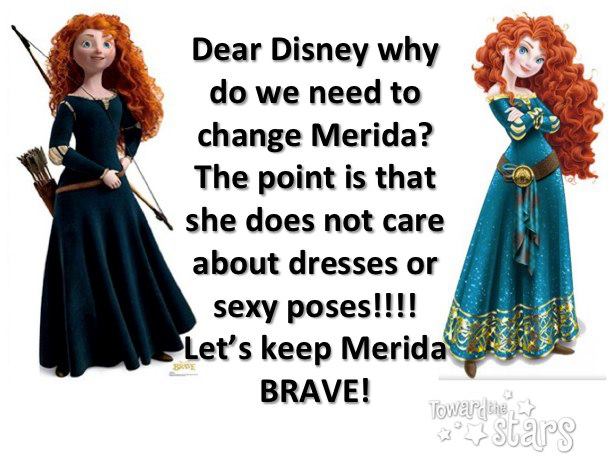 Parents, educators, health professionals…arise.
Parents, educators, health professionals…arise.
This could be our catalyst moment to scale the sexualization conversation into the public health arena.
After all, when the daring and adventurous Merida character from the movie Brave had a Disney ‘makeover’ into a formulaic merchandising effort of sparkly princess pablum, it prompted a mass rallying cry of ENOUGH with parents, youth, advocates, and the film’s co-director herself, Brenda Chapman launching the “Keep Merida Brave” meme to remind the toy industry that girls do NOT want to be siphoned into lock step lock boxes of what women are ‘expected’ to be. (The original petition from A Mighty Girl racked up well over 253,000 signatures! Brave Girls Want is the ‘next step’ toward sustaining the movement of change)
Marissa Mayer…you are the perfect recruit to flip this script.
“Brave Girls Want” leaders like you to join us, fund us, and be the change.
Now THAT would be bold.
Visual Credit for Marissa Mayer photo: Vogue Photographer Mikael Jansson
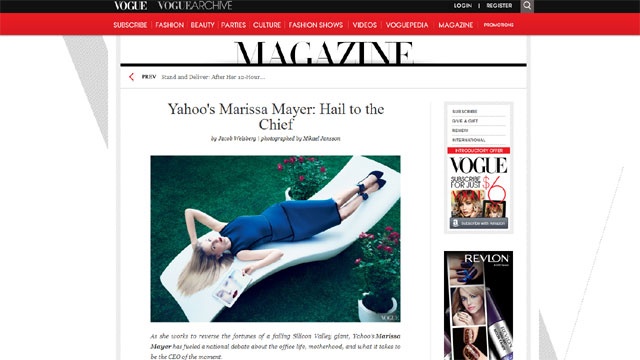









Speak Your Mind